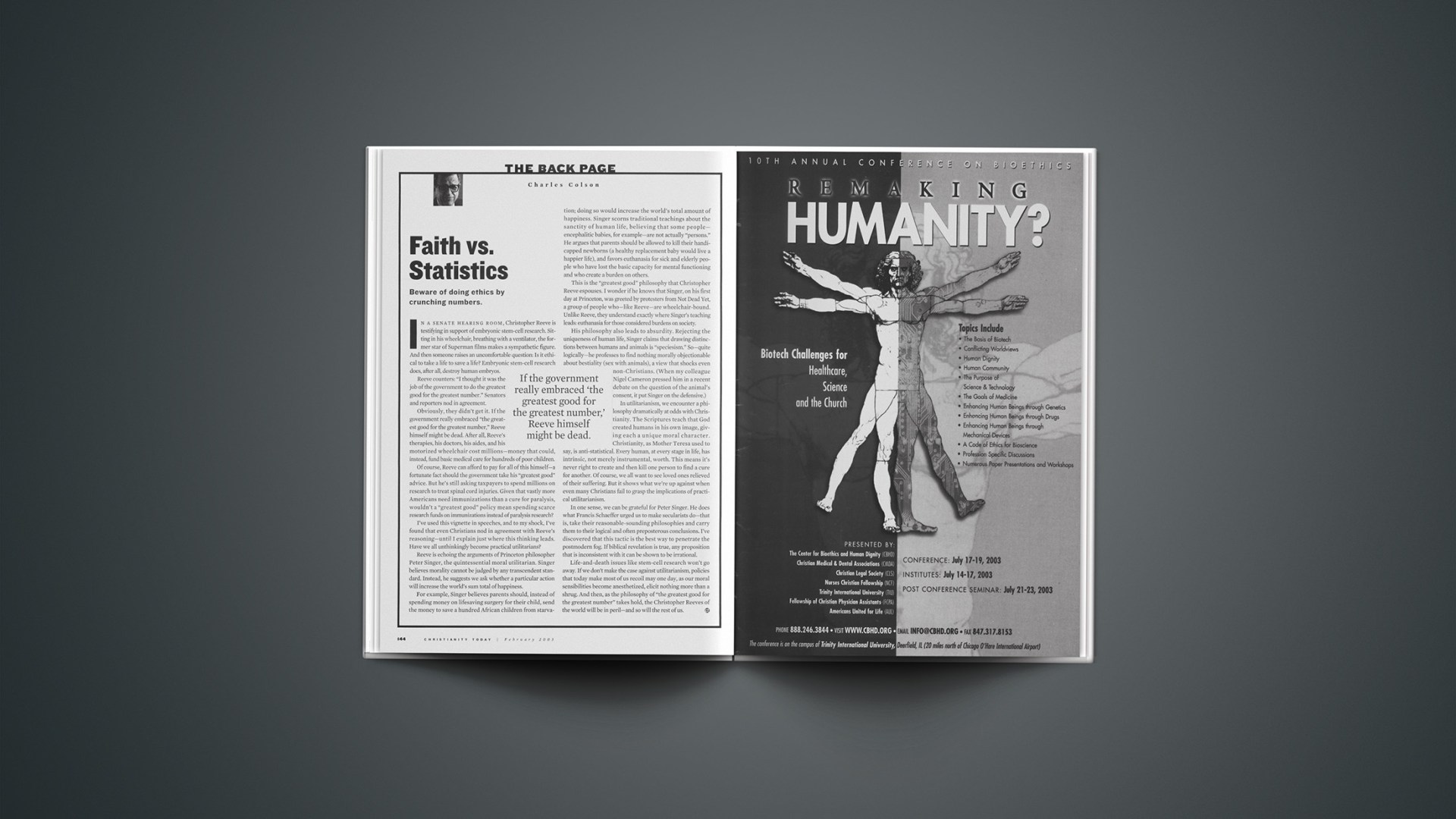In a senate hearing room, Christopher Reeve is testifying in support of embryonic stem-cell research. Sitting in his wheelchair, breathing with a ventilator, the former star of Superman films makes a sympathetic figure. And then someone raises an uncomfortable question: Is it ethical to take a life to save a life? Embryonic stem-cell research does, after all, destroy human embryos.
Reeve counters: “I thought it was the job of the government to do the greatest good for the greatest number.” Senators and reporters nod in agreement.
Obviously, they didn’t get it. If the government really embraced “the greatest good for the greatest number,” Reeve himself might be dead. After all, Reeve’s therapies, his doctors, his aides, and his motorized wheelchair cost millions—money that could, instead, fund basic medical care for hundreds of poor children.
Of course, Reeve can afford to pay for all of this himself—a fortunate fact should the government take his “greatest good” advice. But he’s still asking taxpayers to spend millions on research to treat spinal cord injuries. Given that vastly more Americans need immunizations than a cure for paralysis, wouldn’t a “greatest good” policy mean spending scarce research funds on immunizations instead of paralysis research?
I’ve used this vignette in speeches, and to my shock, I’ve found that even Christians nod in agreement with Reeve’s reasoning—until I explain just where this thinking leads. Have we all unthinkingly become practical utilitarians?
Reeve is echoing the arguments of Princeton philosopher Peter Singer, the quintessential moral utilitarian. Singer believes morality cannot be judged by any transcendent standard. Instead, he suggests we ask whether a particular action will increase the world’s sum total of happiness.
For example, Singer believes parents should, instead of spending money on lifesaving surgery for their child, send the money to save a hundred African children from starvation; doing so would increase the world’s total amount of happiness. Singer scorns traditional teachings about the sanctity of human life, believing that some people—encephalitic babies, for example—are not actually “persons.” He argues that parents should be allowed to kill their handicapped newborns (a healthy replacement baby would live a happier life), and favors euthanasia for sick and elderly people who have lost the basic capacity for mental functioning and who create a burden on others.
This is the “greatest good” philosophy that Christopher Reeve espouses. I wonder if he knows that Singer, on his first day at Princeton, was greeted by protesters from Not Dead Yet, a group of people who—like Reeve—are wheelchair-bound. Unlike Reeve, they understand exactly where Singer’s teaching leads: euthanasia for those considered burdens on society.
His philosophy also leads to absurdity. Rejecting the uniqueness of human life, Singer claims that drawing distinctions between humans and animals is “speciesism.” So—quite logically—he professes to find nothing morally objectionable about bestiality (sex with animals), a view that shocks even non-Christians. (When my colleague Nigel Cameron pressed him in a recent debate on the question of the animal’s consent, it put Singer on the defensive.)
In utilitarianism, we encounter a philosophy dramatically at odds with Christianity. The Scriptures teach that God created humans in his own image, giving each a unique moral character. Christianity, as Mother Teresa used to say, is anti-statistical. Every human, at every stage in life, has intrinsic, not merely instrumental, worth. This means it’s never right to create and then kill one person to find a cure for another. Of course, we all want to see loved ones relieved of their suffering. But it shows what we’re up against when even many Christians fail to grasp the implications of practical utilitarianism.
In one sense, we can be grateful for Peter Singer. He does what Francis Schaeffer urged us to make secularists do—that is, take their reasonable-sounding philosophies and carry them to their logical and often preposterous conclusions. I’ve discovered that this tactic is the best way to penetrate the postmodern fog. If biblical revelation is true, any proposition that is inconsistent with it can be shown to be irrational.
Life-and-death issues like stem-cell research won’t go away. If we don’t make the case against utilitarianism, policies that today make most of us recoil may one day, as our moral sensibilities become anesthetized, elicit nothing more than a shrug. And then, as the philosophy of “the greatest good for the greatest number” takes hold, the Christopher Reeves of the world will be in peril—and so will the rest of us.
Copyright © 2003 Christianity Today. Click for reprint information.
Related Elsewhere
A ready-to-download Bible Study on this article is available at ChristianBibleStudies.com. These unique Bible studies use articles from current issues of Christianity Today to prompt thought-provoking discussions in adult Sunday school classes or small groups.
A 2000 Christianity Today editorial, “Thus Spoke Superman: Troubling language frames the stem-cell debate,” also referenced Christopher Reeve’s stance on bioethical research.
Colson has addressed bioethics in previous CT columns including:
Undaunted | Bioethics challenges are huge. But so is God. (July 31, 2002)
The New Tyranny | Biotechnology threatens to turn humanity into raw material. (Oct. 5, 2001)
Christianity Today’s Life Ethics archive and sister publication Books & Culture’s Science Pages have more perspective on bioethics.
Nigel M. de S. Cameron is director of the Council for Biotechnology Policy at the Wilberforce Forum. In 1995, he wrote Christianity Today’s “Doctors Under Oath | Modern medicine has misplaced its moral compass. Can Hippocrates help?” He also interviewed Leon Kass, head of the President’s Council on Bioethics for the June issue.
Previous Christianity Today coverage and commentary on bioethics includes:
Limited Cloning Ban Disappoints Prolife Groups | President’s Council on Bioethics recommends a four-year moratorium on research cloning. (Aug. 19, 2002)
Defender of Dignity | Leon Kass, head of the President’s Council on Bioethics, hopes to thwart the business-biomedical agenda. (June 7, 2002)
Goodbye, Dolly | We need nothing less than a total ban on human cloning. (May 15, 2002)
Weblog: ‘All Human Cloning Is Wrong,’ Says Bush | Public is 4-to-1 against all human cloning, but Senate is evenly split on comprehensive ban. (April 11, 2002)
Books & Culture Corner: “Daddy, What Is the Soul?” | Does the church have an answer? (December 10, 2001)
Books & Culture Corner: ‘We Now Know’ | The boast of imperial science. (December 3, 2001)
Opinion Roundup: ‘Only Cellular Life’? | Christians, leaders, and bioethics watchdogs react to the announcement that human embryos have been cloned. (November 29, 2001)
Weblog: Human Cloning’s ‘Success’ | Human embryos cloned for 1st time. (November 26, 2001)
Books & Culture Corner: “24 Cow Clones, All Normal” … | Oh yes, and a few cloned human embryos that died. (November 26, 2001)
Gen-Etiquette | Scientists may be mapping the genome, but it will be up to us to determine where the map will lead. (Oct. 4, 2001)
Manipulating the Linguistic Code | Religious language falling into the hands of scientists can be a fearful thing. (Oct. 4, 2001)
Times Fifty | Can a clone be an individual? A short story. (Oct. 2, 2001)
The Genome Doctor | The director of the National Human Genome Research Institute answers questions about the morality of his work. (Oct. 1, 2001)
A Matter of Life and Death | Why shouldn’t we use our embryos and genes to make our lives better? The world awaits a Christian answer. (Sep. 28, 2001)
Wanna Buy a Bioethicist? | Some corporations have discovered that bioethics makes good public relations. (Sep. 28, 2001)
Embryos Split Prolifers | Bush decision pleases some, keeps door open for disputed research. (August 27, 2001)
Two Cheers | President Bush’s stem-cell decision is better than the fatal cure many sought. (August 10, 2001)
Tissue of Lies? | Latest stem-cell research shows no urgent need to destroy human embryos for the cause of science. (Sept. 28, 2000)
Beyond the Impasse to What? | Stem-cell research may not need human embryos after all. But why are we researching in the first place? (Aug. 18, 2000)
Editorial: The Biotech Temptation (July 12, 1999)
Stop Cloning Around (April 27, 1997)
Recent Charles Colson columns for Christianity Today include:
Just War in Iraq | Sometimes going to war is the charitable thing to do. (Dec. 10, 2002)
A Clan of One’s Own | Hacking through the jungle of identity politics. (Oct. 9, 2002)
Undaunted | Bioethics challenges are huge. But so is God. (July 31, 2002)
The Wages of Secularism | New laws won’t prevent another Enron. (June 4, 2002)
More Doctrine, Not Less | We need to proclaim truth to a truth-impaired generation. (April 15, 2001)
Post-Truth Society | The recent trend of lying is no accident. (March 4, 2002)
Drawing the Battle Lines | We need to be informed and discerning about the Islamic worldview. (Jan. 9, 2002)
Wake-up Call | If September 11 was a divine warning, it’s God’s people who are being warned. (Nov. 5, 2001)
The New Tyranny | Biotechnology threatens to turn humanity into raw material. (Oct. 5, 2001)
Merchants of Cool | We should be angry that the media hawks violence and that parents allow it. (June 6, 2001)
Slouching into Sloth | The XFL is but the latest sign of the coarsening of our culture. (Apr. 17, 2001)
Checks and (out of) Balance | Moral truth is in jeopardy when the courts enter the business of making law. (Feb. 27, 2001)
Pander Politics | Poll-driven elections turn voters into self-seeking consumers.(Jan. 3, 2001)
Neighborhood Outpost | Changing a culture takes more than politics. (Nov.8, 2000)
MAD No More | In this post-Cold War era, it’s time to rethink our nation’s defensive strategy. (Sept. 27, 2000)
Salad-Bar Christianity | Too many believers pick and choose their own truths. (Aug. 8, 2000)
A Healthy ‘Cult’ | A lively response by one unusual audience shows how God’s power transforms culture. (June 12, 2000)










